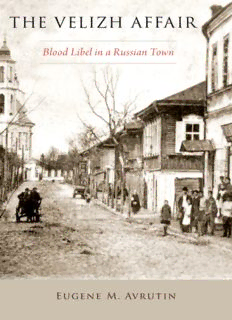
The Velizh Affair: Blood Libel in a Russian Town PDF
Preview The Velizh Affair: Blood Libel in a Russian Town
T V A HE ELIZH FFAIR • ii THE VELIZH AFFAIR • Blood Libel in a Russian Town • EUGENE M. AVRUTIN 1 iv 1 Oxford University Press is a department of the University of Oxford. It furthers the University’s objective of excellence in research, scholarship, and education by publishing worldwide. Oxford is a registered trade mark of Oxford University Press in the UK and certain other countries. Published in the United States of America by Oxford University Press 198 Madison Avenue, New York, NY 10016, United States of America. © Oxford University Press 2018 All rights reserved. No part of this publication may be reproduced, stored in a retrieval system, or transmitted, in any form or by any means, without the prior permission in writing of Oxford University Press, or as expressly permitted by law, by license, or under terms agreed with the appropriate reproduction rights organization. Inquiries concerning reproduction outside the scope of the above should be sent to the Rights Department, Oxford University Press, at the address above. You must not circulate this work in any other form and you must impose this same condition on any acquirer. Library of Congress Cataloging- in- Publication Data Names: Avrutin, Eugene M., author. Title: The Velizh affair : blood libel in a Russian town / Eugene M. Avrutin. Description: New York, NY : Oxford University Press, [2018] | Includes bibliographical references and index. Identifiers: LCCN 2017011535 (print) | LCCN 2017012749 (ebook) | ISBN 9780190640538 (updf) | ISBN 9780190640545 (epub) | ISBN 9780190640521 (hardback : alk. paper) Subjects: LCSH: Blood accusation—Russia—Velizh—History—19th century. | Antisemitism—Russia—Velizh—History—19th century. | Jews—Persecutions—Russia—Velizh—History—19th century. | Trials (Murder)—Russia—Velizh. | Russia—Ethnic relations. | Velizh (Russia)—Ethnic relations. Classification: LCC BM585.2 (ebook) | LCC BM585.2 .A97 2017 + (print) | DDC 305.892/404727—dc23 LC record available at https://lccn.loc.gov/2017011535 1 3 5 7 9 8 6 4 2 Printed by Sheridan Books, Inc., United States of America To Yingying and Abi for being there vi Contents • Preface ix Acknowledgments xvii Introduction 1 1. Fedor Goes for a Walk 13 2. Small- Town Life 31 3. Tsar Alexander Pays a Visit 57 4. The Confrontations 79 5. Grievances 101 6. The Investigation Widens 117 7. Boundaries of the Law 133 Epilogue 153 Appendix: Jewish Prisoners Held in the Town of Velizh 161 Notes 163 Selected Bibliography 197 Index 213 vii viii PrefaCe • On the mOrning Of December 5, 1919, in revolutionary Petrograd, the historian Simon Dubnov walked several miles along a maze of dark and empty streets to a meeting of the newly inaugurated Commission for Investigating Blood Libel Materials.1 This was a desperate time in the city. The brutality and chaos of the Civil War wreaked havoc on the early Soviet state. In the nearly two years after the collapse of the tsar- ist regime in February 1917, the population of Petrograd decreased by 50 percent. The death toll skyrocketed, as did the unemployment rate. Shortages of fuel, electricity, clean water, and basic food staples such as flour, eggs, bread, and potatoes meant a drastic fall in the standard of living for those who remained. The sudden collapse of all institutions of law and order resulted in an unprecedented number of petty thefts, muggings, robberies, and rapes. Empty apartments and boarded- up buildings could be found on every street corner. Rubbish littered court- yards and alleyways. The closure of markets, shops, factories, and restau- rants brought an eerie silence to one of Europe’s most dazzling cities.2 In the early days of the revolution, Dubnov had led a modest but privileged existence as an academic. The beneficiary of a special schol- ar’s ration—c onsisting mainly of bread, thin soup, cabbage, and salted fish— the distinguished historian immersed himself in work. Like so many politically engaged writers, Dubnov worked tirelessly to build a new Jewish cultural sphere that lay dormant under the shackles of tsar- ist oppression.3 Dubnov converted the kitchen, the only room in the ix
Description: